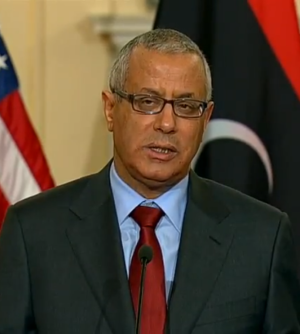Libya must solve militia problem to avoid foreign intervention over oil – By Jason Pack and Haley Cook


Libyan Prime Minister Ali Zeidan has until recently been reticent to use force against militias holding his administration to ransom.
One of Libya’s most complex dilemmas is the continuing occupation of multiple oil and gas production sites, pipelines, platforms, and export terminals by armed protestors. Meanwhile, a rash of assassinations of security officials, criminal activity, and sporadic militia clashes have spread the nascent Libyan security institutions thin. A recent political opinion focus group survey conducted by the National Democratic Institute found that, “Libyans blame the government for continued insecurity and express a desire for the state to exert its authority and address the issue.”
In cases when community-based mediation has not been successful, can governmental authority be asserted? Time and time again the Libyan government has threatened the use of force but weak security institutions and an ingrained dislike of using it against protestors –even armed ones – especially on behalf of Prime Minister Ali Zidan have so far prevented the use of force as a viable option. In recent weeks, the government has seemingly changed its policies regarding the use of force, and most recently Libyan Oil Minister Abdelbari al-Arusi said on December 4th that those oil ports still closed would reopen by December 10th following the Libyan Army’s December 1st warning for occupiers to disperse – or else – without describing exactly what the plan might entail.
Serious questions regarding government capacity to carry out such a plan remain. However, the recent withdrawal of outside militias from Tripoli, followed by an influx of soldiers to replace the security functions of the brigades and ensure their removal, may signal a turning point for the nation. Hope is growing that a solution can be reached to remove the unauthorized armed groups throughout the country including those disrupting oil sites.
A solution cannot come too soon. After five months of severe cuts in Libyan oil and gas production, the main source of government revenue and the country’s income, Libya is facing unexpected budgetary shortfalls. Output has fallen to just 225,000 bpd or only 20 percent of capacity, as Libyan Prime Minister Ali Zeidan mentioned in a November 27th press conference. Libya has already dipped into its foreign currency reserves for $7 billion and Deputy Central Bank Governor Ali El-Hebri said on December 3rd that it will have to spend another $6 billion this month to keep functioning, assuming oil strikes continue.
Oil Strikes and Protests
Though the tactics used to extract concessions from the government at various oil and gas installations are similar, the demands and desires of groups are different. In Western and Southern Libya, ethnic minorities have been the primary participants in oil and gas disruptions, seeking attention for protection to prevent further years of marginalization. The Southern Sharara oilfield was shut down again for the sixth time on 27th October by a Tuareg group seeking greater access to citizenship registration, development of local areas, and the reinstatement of local council members rejected by the central government. Oil exports from the Western oil terminal at Zawiya halted as a result. A Tubu group has also been blockading the Sarir field in Southern Libya to get improved infrastructure in the area as well as a separate local council in Kufra for the Tubu.
On October 26 an Amazigh group began occupation of the Mellitah terminal and threatened to cut the flow of gas through the Greenstream pipeline to Italy if the minority representation allotted to the Amazigh in the future constitutional drafting committee was not increased. Encouragingly, they suspended the Mellitah blockade on November 16th with sensitivity to the tragic deaths in Tripoli at the hand of the militias.
A major concern for the Amazigh community is the recognition of Tamazight as an official language in the new Libyan constitution. In one move that may lessen incentives to disrupt oil in Libya’s northwest, the Ministry of Education announced that Tamazight will be taught as a subject in Amazigh area schools starting next year. On November 24th, a measure to give Tamazight an official language status in the Temporary Constitutional Declaration received a majority of votes in the General National Congress but the measure did not pass due to the technicality that constitutional amendments require a two-thirds majority of votes.
A more intractable problem are the oil strikes in Eastern Libya at Sidra, Ras Lanuf, Brega, and Zueitina that have turned from strikes over employee grievances into an attempt at asserting autonomy for Libya’s Eastern Cyrenaica region. Petroleum Facilities Guard members under the direction of Ibrahim Jadhran have occupied oil installations since July. Once the commander of the central region of the Petroleum Facilities Guard sworn to protect facilities from armed occupiers, Jadhran is head of the Political Bureau of Cyrenaica, one of the major federalist groups in the country. The Political Bureau of Cyrenaica unilaterally declared a federal state in Cyrenaica on October 24th with its own prime minister and Council of Ministers and announced a separate oil company, the Libyan Oil and Gas Corporation, on November 11th. Jadhran intends to sell oil from Eastern Libya through the new company, asserting that he will be a better guardian of the region’s oil revenue than the current government. Meanwhile, the central government views him as a criminal who would keep oil proceeds for his own benefit.
Use of Force
On October 20 the Ministry of Defense warned in a measure to prevent unauthorized oil sales that any oil tanker or other vessel entering Libyan waters without permission would be destroyed. On November 11th Prime Minister Ali Zeidan issued a 10-day deadline to Ibrahim Jadhran to disperse. When the deadline was reached on 22nd November Zeidan said in a press conference that action would be taken, but such unspecified action is still forthcoming.
Extensive mediation attempts have taken place in Eastern Libya over the past few months involving central government officials, protestors, and with seemingly little headway, but Prime Minister Ali Zeidan said on December 4 that “there is a set of measures about to be implemented that will lead to” a deal to reopen the oil ports next week. On the one hand such pronouncements are usually treated with a grain of salt as the government lacks credibility and its bargaining position has been severely weakened by previous appeasement and its lack of monopoly over the use of force with its weak military and security institutions beholden to a variety of militias groups.
Despite this continuity, something has changed. The central authorities in coordination with local leaders more than two years after the end of the Libyan revolution have finally started to regain power over the militias. According to Law 27 regarding Tripoli and Law 53 regarding Benghazi, all militias should leave those cities and give up their weapons by the end of the year. Groups that do not comply will be removed by force. Some are becoming hopeful that real progress may be achieved because of the changed popular mood.
The Game Changer
At least 43 died and at least 460 were injured on November 15th when a militia from Misrata fired anti-aircraft weapons into a crowd of demonstrators organized by the Tripoli Local Council calling for non-local brigades to leave the city. After that tragedy, militias actually began to comply with Law 27 and started to withdraw from Tripoli, replaced in their security functions by newly minted soldiers from Libya’s official army. Following the start of the withdrawal of militias from Tripoli and the army’s partially successful removal of Ansar Al Sharia from Benghazi, armed mobs occupying oil installations could be next.
An additional hope for the imminent end to Eastern oil strikes is the increasing frustration among local populations with the economic implications and hence, their waning support for the protest movements. Libyan Oil Minister Abdelbari Al Arusi said on December 4th that local people from the same tribes as the protesters told the government that if it is unable to bring an end to the crisis and enable oil ports to reopen that they will take matters into their own hands saying: “If you don’t open, we’re going to use force.”
Alternatively, if Libya is unable to solve its problems with the militias and other armed groups internally then a foreign peacekeeping force may be actually called into help. The Chief of the General Staff of the Armed Forces warned oil strikers on December 1st “not to provide an excuse for the world to interfere in the internal affairs of our country.”
Jason Pack is a researcher at Cambridge University, president of Libya-Analysis.com, and editor of The 2011 Libyan Uprisings and the Struggle for the Post-Qaddafi Future (Palgrave Macmillan June 2013). Haley Cook is director of research at Libya-Analysis.com.
This article was previously published by Majallah.






